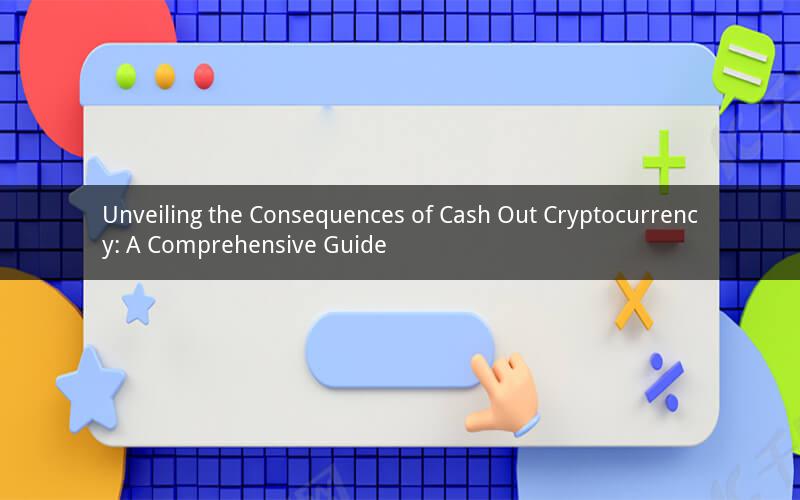
When you decide to cash out your cryptocurrency, you are taking a significant step in your financial journey. This process involves converting your digital assets into fiat currency, which can be used for various purposes such as purchasing goods and services, investing in other assets, or simply holding as a store of value. However, what happens when you cash out cryptocurrency? This article delves into the potential outcomes and factors to consider before making this decision.
1. Tax Implications
One of the primary concerns when cashing out cryptocurrency is the tax implications. Depending on your jurisdiction, you may be required to pay taxes on the capital gains from selling your digital assets. It is crucial to understand the tax laws in your country or region to avoid any legal repercussions.
1.1 Tax Rates
The tax rates on cryptocurrency gains vary widely, with some countries imposing flat rates while others use progressive tax brackets. It is essential to research the specific tax rates applicable to your situation to ensure you are prepared for the financial implications.
1.2 Reporting Requirements
In addition to paying taxes on your gains, you may also be required to report your cryptocurrency transactions to tax authorities. Failure to comply with these reporting requirements can result in penalties and fines.
2. Transaction Fees
When you cash out cryptocurrency, you will likely incur transaction fees. These fees can vary depending on the cryptocurrency you are using and the platform you choose to sell on. Understanding the transaction fees involved is crucial to ensure you are not paying more than necessary.
2.1 Platform Fees
Many cryptocurrency exchanges charge fees for facilitating transactions. These fees can be a percentage of the transaction amount or a fixed fee. It is important to compare fees across different platforms to find the most cost-effective option.
2.2 Network Fees
Some cryptocurrencies, such as Bitcoin, require network fees to confirm transactions. These fees are paid to miners who validate and add transactions to the blockchain. The amount of network fees can vary based on network congestion and the size of the transaction.
3. Volatility
Cryptocurrency prices are highly volatile, which means they can fluctuate rapidly. When you cash out, the value of your assets may be different from when you bought them. Understanding the potential impact of volatility is crucial to avoid unexpected financial losses.
3.1 Timing the Market
Many investors try to time the market to maximize their gains when cashing out. However, predicting market movements is incredibly challenging, and timing the market correctly can be luck rather than skill.
3.2 HODLing
An alternative strategy is to hold onto your cryptocurrency (HODL) and ride out the volatility. This approach requires patience and a long-term perspective, as the market may experience significant fluctuations over time.
4. Privacy Concerns
When you cash out cryptocurrency, you may face privacy concerns. Unlike traditional banking, cryptocurrency transactions are recorded on a public blockchain, which means anyone can view your transaction history. This can raise concerns about privacy and the potential for theft or fraud.
4.1 Anonymity
Some cryptocurrencies offer a higher level of anonymity than others. For instance, Monero and Zcash are designed to obscure the sender, recipient, and transaction amount, making them more private than Bitcoin.
4.2 Exchanges and Privacy
Exchanges may require you to provide personal information to comply with anti-money laundering (AML) and know your customer (KYC) regulations. This information can be used to track your transactions and potentially compromise your privacy.
5. Alternative Investment Opportunities
Cashing out cryptocurrency can provide you with the opportunity to explore alternative investment options. Depending on your financial goals and risk tolerance, you may consider investing in other assets such as stocks, bonds, real estate, or even starting your own business.
5.1 Asset Diversification
Investing in a diversified portfolio can help mitigate the risk associated with any single asset class. Cashing out cryptocurrency and reallocating your funds to other investments can provide a more balanced approach to wealth accumulation.
5.2 Business Opportunities
With the cash from your cryptocurrency sale, you may have the opportunity to start your own business or invest in existing businesses. This can provide a new source of income and potentially create long-term wealth.
In conclusion, what happens when you cash out cryptocurrency involves various factors to consider, including tax implications, transaction fees, volatility, privacy concerns, and alternative investment opportunities. By understanding these aspects and making informed decisions, you can navigate the process effectively and achieve your financial goals.
Questions and Answers:
1. Q: Do I have to pay taxes on cryptocurrency gains in all countries?
A: No, tax laws on cryptocurrency gains vary by country. It is essential to research the tax regulations in your specific jurisdiction to determine if you are required to pay taxes on your gains.
2. Q: How can I minimize transaction fees when cashing out cryptocurrency?
A: To minimize transaction fees, you can compare fees across different cryptocurrency exchanges and choose the platform with the lowest fees. Additionally, consider the network fees associated with the cryptocurrency you are selling.
3. Q: Is it possible to completely hide my cryptocurrency transactions?
A: While some cryptocurrencies offer a higher level of anonymity, it is challenging to completely hide your transactions. However, using privacy-focused cryptocurrencies and exchanges can help protect your privacy to some extent.
4. Q: Can I invest the cash from my cryptocurrency sale in other assets?
A: Yes, cashing out cryptocurrency provides you with the opportunity to invest in various assets, such as stocks, bonds, real estate, or starting your own business. It is essential to consider your financial goals and risk tolerance when choosing alternative investment options.
5. Q: Is it better to sell cryptocurrency during a bull market or a bear market?
A: There is no definitive answer to this question. Some investors believe that selling during a bull market can maximize gains, while others prefer to HODL during a bear market and ride out the volatility. Ultimately, the decision depends on your investment strategy and risk tolerance.